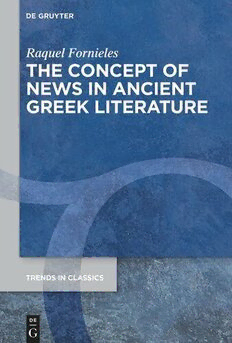
The Concept of News in Ancient Greek Literature PDF
Preview The Concept of News in Ancient Greek Literature
Raquel Fornieles The Concept of News in Ancient Greek Literature Trends in Classics – Supplementary Volumes Edited by Franco Montanari and Antonios Rengakos Associate Editors Stavros Frangoulidis · Fausto Montana · Lara Pagani Serena Perrone · Evina Sistakou · Christos Tsagalis Scientific Committee Alberto Bernabé · Margarethe Billerbeck Claude Calame · Kathleen Coleman · Jonas Grethlein Philip R. Hardie · Stephen J. Harrison · Stephen Hinds Richard Hunter · Giuseppe Mastromarco Gregory Nagy · Theodore D. Papanghelis Giusto Picone · Alessandro Schiesaro Tim Whitmarsh · Bernhard Zimmermann Volume 141 Raquel Fornieles The Concept of News in Ancient Greek Literature ISBN 978-3-11-102166-9 e-ISBN (PDF) 978-3-11-102237-6 e-ISBN (EPUB) 978-3-11-102295-6 ISSN 1868-4785 Library of Congress Control Number: 2022946900 Bibliographic information published by the Deutsche Nationalbibliothek The Deutsche Nationalbibliothek lists this publication in the Deutsche Nationalbibliografie; detailed bibliographic data are available on the Internet at http://dnb.dnb.de. © 2023 Walter de Gruyter GmbH, Berlin/Boston Editorial Office: Alessia Ferreccio and Katerina Zianna Logo: Christopher Schneider, Laufen Printing and binding: CPI books GmbH, Leck www.degruyter.com Preface In this book I aim to show that the concept of news that we have today is not a modern invention, but rather a social and cultural institution that has been passed down to us by the Ancient Greeks. This concept is only modified by the social, political and economic conditions that make our society different from theirs. This book started out as my doctoral thesis, “The transmission of news in Ancient Greek Literature” (recognized with the Award of the Spanish Society for Classical Studies), which I wrote at the Universidad Autónoma de Madrid and submitted in 2015. I wish to express my sincere gratitude to my supervisor, Emil- io Crespo, and thank the members of the committee before whom I defended my thesis: Marina Benedetti, Luz Conti, Óscar Loureda, Luis Macía and Rafael Mar- tínez. I was fortunate enough to have been given valuable advice and useful suggestions from a number of colleagues, including Georgios Giannakis and Carmen Leal Soares, who also wrote the reports that were required for me to be awarded an International PhD. It is very difficult to express in a few words the gratitude I feel towards my friends and my family. This book would not have been possible if it were not for the love of the most important people in my life: my parents, Matías and Anto- nia, my brother, Matías, and, of course, Roberto, whose unconditional support I felt at every stage of this journey. This book is dedicated to all of them and, above all, to Adriana and Héctor. https://doi.org/10.1515/9783111022376-202 Contents Preface V List of Figures IX Introduction XI The approach from Anthropology XIV The concept of news today XVI The concept of news in Ancient Greek Literature XVII Using ἄγγελος and its derivatives to understand the concept of news XVII Etymology: ἄγγελος, a Greek creation XX Meanings XXI Homer: The Iliad and the Odyssey 1 Κήρυκες: heralds by profession 2 Ἄγγελοι: anyone can be a messenger 5 From the death of Patroclus to the return of Odysseus: bad and good news 13 Final remarks 32 Greek Lyric Poetry: Pindar and Bacchylides 34 Two practically identical figures 35 The triumph is news 38 Final remarks 45 Tragedy 47 Κήρυκες: heralds by profession 47 Ἄγγελοι: professional messengers 58 Why messenger scenes? 60 The presence of the chorus makes scene-shifts practically impossible 60 A chorus cannot act crowd-scenes 60 Miracles cannot be shown on stage 61 Death on stage was not feasible 61 Literary tradition 62 Defining the tragic messenger 62 Ἄγγελοι play an informative role 65 Ἄγγελοι are eyewitnesses: the αὐτοψία 66 Ἄγγελοι reinforce their speeches with statements from the main characters of the events they relate 68 VIII Contents The news transmitted by ἄγγελοι is completely reliable 69 Criteria for classifying characters as ἄγγελοι 70 From war to suicides: a wide range of news 72 Final remarks 100 Aristophanic Comedy 101 Κήρυκες: heralds by profession 101 Ἄγγελοι: the parody of the tragic messenger 106 Absurd announcements: the mockery of tragic news 115 Final remarks 125 Historians: Herodotus, Thucydides and Xenophon 127 Ἄγγελοι and κήρυκες: professionals in diplomatic missions 129 Bearers of news 134 Spies looking for information from the enemy 139 Royal messengers 143 From news of war to legal terms 143 Final remarks 182 Greek Oratory: Isocrates, Lysias, Aeschines and Demosthenes 185 No news from the messenger 185 Public matters and legal language 187 Final remarks 213 Fake News 215 Derivatives of ἄγγελος: truth and falsehood 216 Fake news in Greek tragedy 219 Fake news in the works of historians 225 Final remarks 229 Conclusions 230 Bibliography 233 General Index 251 Index Locorum 255 List of Figures Fig. 1: Ἄγγελος and its derivatives in Homer, Pindar, Bacchylides, Aeschylus, Sophocles, Euripides, Aristophanes, Herodotus, Thucydides, Xenophon, Lysias, Isocrates, Demos- thenes and Aeschines. XVIII Fig. 2: Ἄγγελος and its derivatives in the Iliad. 14 Fig. 3: Ἄγγελος and its derivatives in the Odyssey. 14 Fig. 4: Ἄγγελος and its derivatives in Pindar’s Odes. 38 Fig. 5: Ἄγγελος and its derivatives in Bacchylides’ Odes. 38 Fig. 6: Ἄγγελος and its derivatives in Aeschylus. 73 Fig. 7: Ἄγγελος and its derivatives in Sophocles. 73 Fig. 8: Ἄγγελος and its derivatives in Euripides. 74 Fig. 9: Ἄγγελος and its derivatives in Aristophanes’ comedies. 115 Fig. 10: Ἄγγελος and its derivatives in Herodotus. 144 Fig. 11: Ἄγγελος and its derivatives in Thucydides. 145 Fig. 12: Ἄγγελος and its derivatives in Xenophon. 146 Fig. 13: Ἄγγελος and its derivatives in Lysias’ speeches. 188 Fig. 14: Ἄγγελος and its derivatives in Isocrates’ speeches. 188 Fig. 15: Ἄγγελος and its derivatives in Demosthenes’ speeches. 189 Fig. 16: Ἄγγελος and its derivatives in Aeschines’ speeches. 189 https://doi.org/10.1515/9783111022376-204
